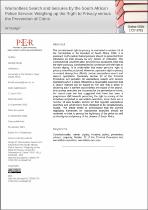| dc.contributor.author | Nortje, Windell | |
| dc.date.accessioned | 2022-05-03T07:54:43Z | |
| dc.date.available | 2022-05-03T07:54:43Z | |
| dc.date.issued | 2021 | |
| dc.identifier.citation | Nortje, Windell ‘Warrantless search and seizures by the South African police service: Weighing up the right to privacy versus the prevention of crime’ Potchefstroom Electronic Law Journal 24 (2021) pp. 1–27 | en_US |
| dc.identifier.issn | 1727-3781 | |
| dc.identifier.uri | http://dx.doi.org/10.17159/1727- 3781/2021/v24i0a8153 | |
| dc.identifier.uri | http://hdl.handle.net/10566/7337 | |
| dc.description.abstract | The constitutional right to privacy is enshrined in section 14 of
the Constitution of the Republic of South Africa, 1996. It is
premised on the notion that all persons should be protected from
intrusions on their privacy by any person or institution. The
Constitutional Court has also, on numerous occasions, held that
the right to privacy is bolstered by its connection with the right to
human dignity. It is undeniable that every person's right to
privacy should be protected. However, a person's right to privacy
is violated when police officials conduct warrantless search and
seizure operations. Generally section 22 of the Criminal
Procedure Act provides for warrantless search and seizure
operations when a police official has a reasonable suspicion that
a search warrant will be issued to him and that a delay in
obtaining such a warrant would defeat the object of the search. | en_US |
| dc.language.iso | en | en_US |
| dc.publisher | Academy of Science of South Africa | en_US |
| dc.subject | Constitutionality | en_US |
| dc.subject | Human dignity | en_US |
| dc.subject | Police | en_US |
| dc.subject | Warrantless seizures | en_US |
| dc.subject | Section 22 of the Criminal Procedure Ac | en_US |
| dc.title | Warrantless search and seizures by the South African police service: Weighing up the right to privacy versus the prevention of crime | en_US |
| dc.type | Article | en_US |

